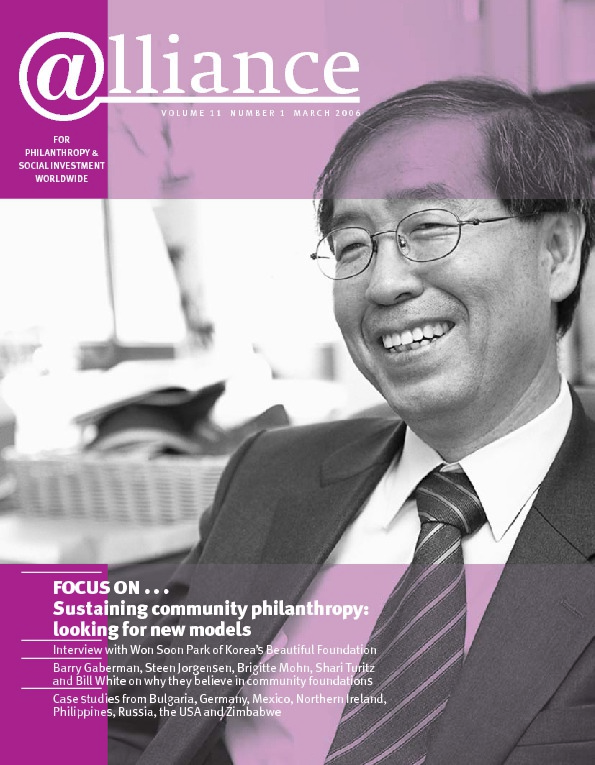In its 25th anniversary year, the Board of Trustees of the Community Foundation for Northern Ireland (CFNI) has decided to place independence before the security offered by government and European Union funding programmes, and to move away from statutory sector funding in order to cultivate other donors.
CFNI has had annual revenue programmes of some £10 million per annum over the last decade, virtually all from the statutory and European sectors, so this is a courageous decision. However, it was a result not of a fit of pique but of mature reflection on the fact that neither social justice issues nor effective community action are likely to be progressed through time-limited, micro-managed programmes that at times seem more answerable to the auditor than to the policymaker.
The essential ‘added value’ of independent funding to CFNI is to allow us to innovate and to take calculated risks. The benefit of being a ‘community’ funder is to be close enough to the ground to recognize areas of need long before statutory bodies pick them up, while bringing the expertise and insights of broader networks to the local level. Whether this is sustainable in a small society of one and a half million people remains to be seen.
CFNI was built on an ethos of local participation, with community activists from all sides of Northern Ireland’s divided society represented on the Board. This enabled us to work both within and between those communities most affected by the conflict. This process really took off with the early management of the EU PEACE Programme Funds. Eight Grantmaking Advisory Committees were established, with representatives drawn from, among others, community groups, victims of violence groups, political ex-prisoner groups, women’s groups and youth organizations – all working on a cross-community basis, albeit, at times, looking over their shoulders.
The challenge of peacebuilding
Peacebuilding in a society slowly emerging from conflict was a major challenge. The Political Ex-Prisoner Advisory Committee, formed in December 1995, is made up of representatives from all the Loyalist and Republican paramilitary groups, who come together to consider funding applications for local reintegration and conflict resolution projects, while also informally exchanging views on the ongoing peace process. Important as these meetings are, they have not proved popular with many local politicians and have attracted adverse coverage in the local media.
CFNI has also developed a proactive programme of social development and peacebuilding in disadvantaged neighbourhoods that have no track record of applying for grants. It was found that many such areas experienced divisive political alignments, sometimes resulting in violent feuding and competing political clientelism. CFNI provides the services of experienced neighbourhood workers as well as access to funding. The peacebuilding dimension was introduced when a cross-community group from ten areas travelled together to South Africa to learn from ongoing developments there.
Putting your money where your mouth is
Will this evidence of a real commitment to community participation, social justice and peacebuilding elicit wider support? The answer is we don’t know, but we’re hopeful. CFNI currently has an Endowment Challenge Fund of £3 million to be matched, on a £1 for £1 basis, before 31 March 2007. With much hard work and effort over the past two years we have managed to raise £2.5 million in donations and pledges on top of our existing endowment of £8 million.[1] However, £2 million of this was provided by one foundation and only the other £500,000 raised locally.
We still have a long way to go. The campaign has taught us a number of things: individual donors in a society emerging from conflict are very cautious, and often want ‘safe’ causes; corporate donors tend to want ‘popular’ causes; and diaspora donors, with a few exceptions, want recognition from their own networks, which are often difficult for a local community foundation to get access to.
The decision to eschew government and EU funding – unless they are adapted to the ethos of the community sector – remains a bold one, but if CFNI is to remain a progressive, socially aware funder, then it must attract investment from organizations that are committed to social justice. By the way, the grants that stirred up the greatest controversy and attracted the greatest volume of hate mail were those to projects in the gay and lesbian community. So even in a conflict-ridden society there is always somebody else to target.
1 The endowment came initially from a UK Government challenge grant. The match came from corporate donors (mainly in Britain and Northern Ireland) and some individual donors, but mainly from UK-based independent trusts.
Avila Kilmurray is Executive Director of the Community Foundation for Northern Ireland. She can be contacted at akilmurray@communityfoundationni.org
See http://www.communityfoundationni.org





Comments (0)